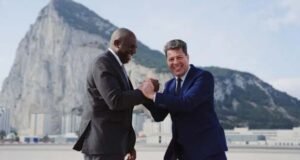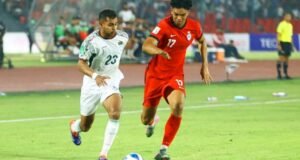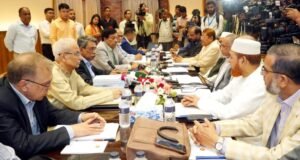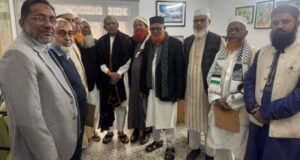 Turkey’s prime minister says he has exhausted all options to form a coalition government after talks with the nationalist MHP failed, pushing the country closer to fresh elections.
Turkey’s prime minister says he has exhausted all options to form a coalition government after talks with the nationalist MHP failed, pushing the country closer to fresh elections.
Ahmet Davutoglu said he would return the mandate to the president.
The main opposition CHP said it should now be given the mandate to form a new government.
The political uncertainty comes amid rising violence in Turkey and neighbouring Iraq and Syria.
Mr Davutoglu’s AK Party lost its 12-year majority rule in Turkey in elections in June largely because of the success of the pro-Kurdish HDP.
The AKP’s coalition talks with the CHP failed last week.
‘No ground’
Speaking after negotiations with Nationalist Movement Party (MHP) leader Devlet Bahceli on Monday, the prime minister said: “I believe that I shared every possible option with the opposition parties.
“Today we discussed four options but there is no ground to take new steps.
“I will meet the president and I will return the mandate if necessary after liaising with him.”
Supporters of the Nationalist Movement Party (MHP) attend a rally head of Turkey’s 7 June parliamentary election
Although Mr Davutoglu’s party secured 41% in the 7 June election, it had to seek support from a rival party to form a coalition, but failed to find agreement with the CHP on foreign policy and education matters.
Correspondents say the CHP is now unlikely to secure the support it needs from both the MHP and the HDP to form a coalition of its own, making fresh elections a more possible outcome.
Latest opinion polls suggest the AKP has increased its support in recent weeks amid heightened tensions in the region.
Turkish forces have carried out attacks on militants from the Islamic State (IS) group in Syria and have bombed Kurdish PKK camps mainly in northern Iraq.
President Recep Tayyip Erdogan, for many years Turkey’s AKP prime minister, has accused the HDP of being the Kurdish rebels’ political wing.
Turkey’s uneasy two-year ceasefire with the PKK fell apart last month, after a suicide bomb blamed on IS killed 32 young activists in the largely Kurdish city of Suruc, close to the Syrian border.
Don't Miss
- Thousands join Tommy Robinson rally, as counter-protesters demonstrate
- Ethnic elegance in satin silk scarf
- JUCSU poll : Independent candidate Jitu elected VP, Shibir-backed Mazharul wins GS
- Bangladesh can be hunger, poverty free in 5yrs: Jamaat Ameer
- Govt advisers complicit in silent consent to humiliate, kill Mahfuz Alam: Nahid Islam
 Weekly Bangla Mirror | Bangla Mirror, Bangladeshi news in UK, bangla mirror news
Weekly Bangla Mirror | Bangla Mirror, Bangladeshi news in UK, bangla mirror news






